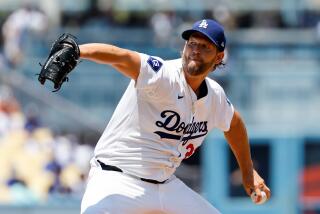Unlikeliest Orioles Savor Moment
- Share via
After nine seasons of shuttling between such places as Glens Falls, N.Y., and Indianapolis, after playing almost three years with a painful toe injury, Tim Hulett very nearly quit baseball last spring.
The Baltimore Orioles had taken only a cursory spring look, and indications were he would spend the entire season at Rochester. Worse, his playing time there might even be sliced depending on how quickly the young draft picks developed.
It was one of those gut-check moments, and for a few days last spring he considered going home.
“You just start thinking about putting your family through another difficult year,” he said. “I have a wife and three young boys, and you eventually reach a point where you say, ‘Enough is enough.’ ”
He didn’t reach that point because he was convinced things might really be different this time. He had had toe surgery in the winter, and he guessed the Orioles would need some help. If he played well in Rochester, he surely would get a chance, if not with the Orioles, with someone else.
From Jay Tibbs to Mark Huismann, from Stanley Jefferson to Jamie Quirk, the ’89 Orioles have had a dozen of these small miracles wrapped inside their larger miracle. While they built and planned around Cal Ripken and Phil Bradley, Bob Milacki and Gregg Olson, they never could have won without a handful of players who were lost in baseball’s deep, dark and seemingly endless attic.
“Luck,” Quirk said. “There are hundreds of talented athletes who didn’t make it because they were either not in the right place, didn’t get the right help or never got the chance. When you do get that chance, you’d better know there’s an amount of luck mixed in.”
These unlikeliest of heroes are huge reasons when one of the worst teams in history in 1988 will be playing for a division championship this weekend in Toronto.
Hulett got his chance because Bill Ripken and Craig Worthington hurt shoulders Aug. 22. He hadn’t expected even a September call-up, but when he was shoved into a pennant race on Aug. 23 he responded.
He has three home runs and 16 RBI in 28 games. He leads the Orioles in RBI over that stretch and is second only to Cal Ripken in home runs (four to three). He has performed so well and so consistently that he essentially has taken second baseman Bill Ripken’s job and will enter spring training as, at worst, a co-starter.
“It has paid off for me to be patient,” he said. “The thing is, I just really believed I could still play well, and if you feel that way you’ve got to give it a shot.”
He speaks in a clubhouse that is packed with reporters who’ve come to track the final days of baseball’s last remaining divisional race. Hulett, 29, would like to say that he grasps everything that has happened to him the last five weeks, but, when his ultimate goal was to put on a big league uniform, the thrill of winning has become an almost incomprehensible bonus.
“I just can’t find the words to describe what this is like,” he said. “The challenge for most players is to get to the big leagues, and once they’re there they want to play in a World Series. It’s really strange for me because if Bill doesn’t get hurt I may not even get a September call-up. I’d had no indication I would. But as I’ve gotten back up here (after three seasons with the White Sox in the mid-’80s), I’ve been able to reestablish my confidence and all that. I don’t know if you ever feel at home in this game, but you can at least feel like you do deserve to be playing.”
Quirk’s season had ended. The New York Yankees and Oakland Athletics had handed him pink slips, and when he returned to his Kansas City home in early August he figured to be spending the rest of the summer with his wife and two children.
Ten days later, his vacation ended abruptly when the Baltimore Orioles phoned looking for a catcher. Their man, Mickey Tettleton, was about to have knee surgery, and, not only had they been turned down by free agent Bob Brenly, they had no one in their minor league system.
A couple of days later, Quirk was behind the plate when Pete Harnisch threw his first major league complete game. That night Orioles Manager Frank Robinson praised Quirk for his handling of Harnisch, for coaxing him through some tough middle innings and forcing him to throw both his change-up and slider.
When Harnisch beat the Milwaukee Brewers on Monday night, Orioles General Manager Roland Hemond said, “He became a major league pitcher tonight.” It was no coincidence that Quirk was one of the first people Harnisch sought out after the game.
Quirk’s landing with the Orioles is the latest stop in a strange year that has seen him released by the Royals, Yankees and Athletics. His handling of Harnisch is the best indication of what he has brought to the Orioles -- “experience and intelligence,” Robinson said. “He has been through it before, and younger players look to see how older ones react.”
Quirk has batted .185, but has driven in nine runs in 47 at-bats, which would figure to about 96 over a full season. He may even have found a home because even if Tettleton’s left knee recovers the Orioles will need a third catcher for 1990.
“It’s not easy changing teams like this,” he said, “but when you find yourself in a situation where you’ve got a chance to win you have to feel fortunate. I think I’ve played well, but it’s a matter of getting a chance. I think there’s some things I’ve been able to add.”
Stanley Jefferson’s odyssey has been the strangest of all. Once a crown jewel in the Mets’ heralded farm system, he was put in a package of players that got Kevin McReynolds from the Padres in 1986. The Padres sent him to the Yankees for Walt Terrell last winter, and the Orioles got him for minor league pitcher John Habyan three months ago.
“Did I ever expect to be here?” he asked. “No, but with all the things that have happened the last couple of years, I can’t predict anymore. I’m to the point where I don’t take anything for granted. The first time you’re traded, it’s tough. But it was good business for the Mets to get McReynolds. When the Yankees got me, I never understood because they had a lot of outfielders. I didn’t like it there, didn’t like the atmosphere and tenseness. You have a bad game, you go to the minors. Someone else has a bad game, you come back up. When I was traded, I wore a smile for two days.”
The Orioles brought him to the majors Aug. 8 after Steve Finley got hurt, and in six weeks he has hit four homers and driven in 20 runs.
In that stretch, only Cal Ripken (eight) and Worthington (five) have hit more home runs and only Ripken (28) has driven in more runs.
On a team loaded with young outfielders, Jefferson has played his way to the top of the pecking order, a pretty strange feeling for someone who was all but told by the Yankees last spring that he didn’t know how to play.
Although he might like to scream and celebrate, he speaks with the cynical voice of someone who has been burned before. The pennant race is nice, he seems to say, but let’s see what tomorrow brings.
“I’m very happy, but I know to take everything one day at a time,” he said. “You get caught up in high expectations and you can get let down pretty fast. I’m not going to do that.” Like Quirk and Hulett, he has enough trouble comprehending an everyday job, much less an everyday job in a pennant race.
“That part of it is in the back of everyone’s mind,” he said. “But when you’re playing, you think about doing your job. The other night I had a runner on third base with one out, and all I thought about was getting him home. You think about the task at hand, then later you can think about the importance of the task at hand.”
More to Read
Go beyond the scoreboard
Get the latest on L.A.'s teams in the daily Sports Report newsletter.
You may occasionally receive promotional content from the Los Angeles Times.










